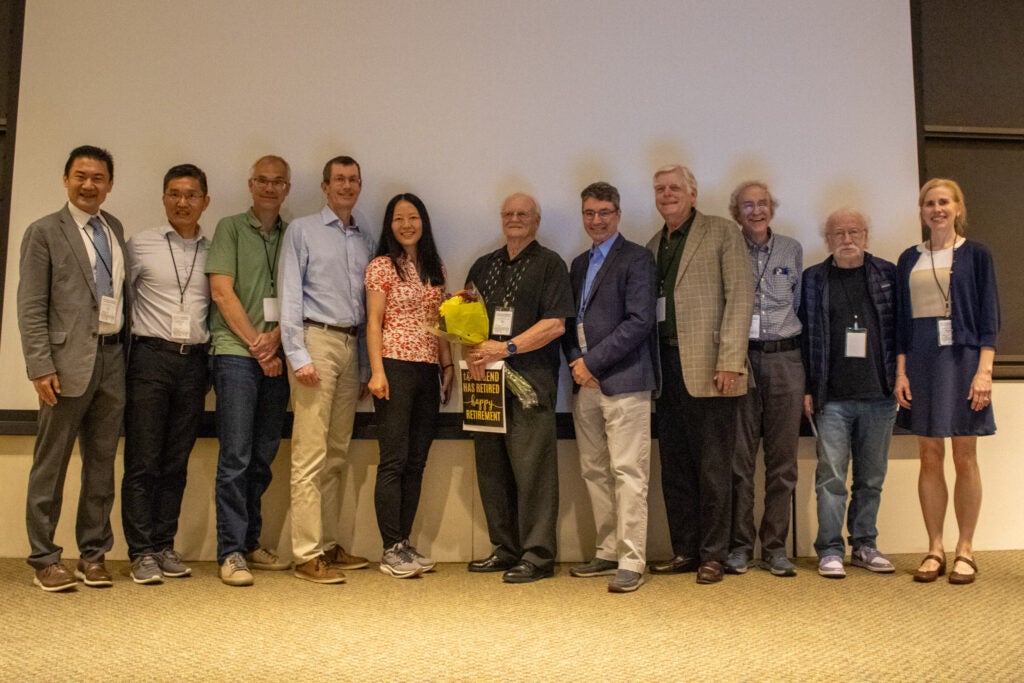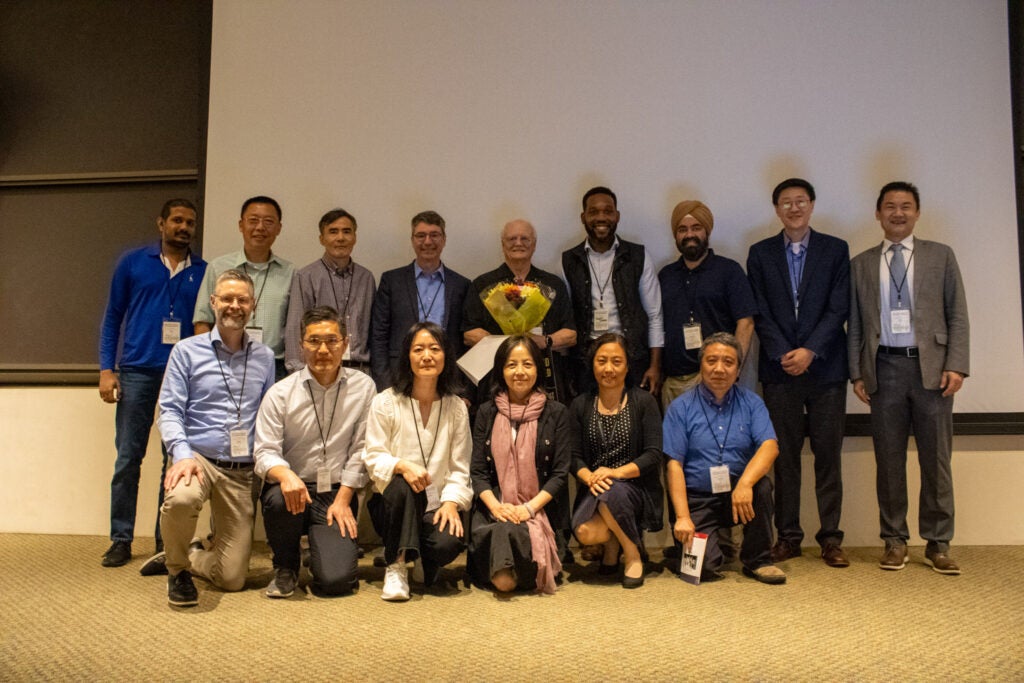The Department of Genetics successfully hosted the Gary D. Stormo Symposium on Computational Biology on May 21, 2024! This event celebrated Dr. Gary D. Stormo and his achievements as a pioneer in computational biology, as well as his legacy as an inspiring mentor and educator. We had 11 renowned speakers who spoke on Dr. Stormo’s accomplishments in computational biology, current developments in the field, and on the history of the Computational Biology Ph.D. program at Washington University in St. Louis.
Below are the recorded sessions of the symposium:
Dr. Ting Wang (Opening Remarks)
Dr. Sean Eddy
Dr. Eddy is the Ellmore C. Patterson Professor and Chair of the Department of Molecular and Cellular Biology at Harvard University, and a Howard Hughes Medical Institute Investigator. He received his Ph.D. from the University of Colorado, Boulder, working in the lab of Dr. Larry Gold. He then completed a postdoctoral fellowship at the MRC Laboratory of Molecular Biology in Cambridge, UK. In 1995 Dr. Eddy joined the Department of Genetics at Washington University in St. Louis, where he was the Alvin Goldfarb Distinguished Professor of Computational Biology. While at Washington University, Dr. Eddy helped establish the Computational Biology program. In 2022, Dr. Eddy was elected a Fellow of the International Society for Computational Biology (ISCB). His lab focuses on computational methods for biological sequence analysis, especially methods to identify evolutionary relationships between protein and RNA sequences.
Dr. William Pearson
Dr. Pearson is Professor Emeritus in the Department of Biochemistry and Molecular Genetics at the University of Virginia School of Medicine, where he served as Vice-Chair. Dr. Pearson received his Ph.D. from the California Institute of Technology, working in the lab of James Bonner, after which he completed a postdoctoral fellowship at Johns Hopkins University. He joined the faculty in the Department of Biochemistry at the University of Virginia, where in collaboration with David Lipman he developed widely used tools for comparing biological sequences. These include the FASTP and FASTA programs that enabled efficient searches of sequence databases. Dr. Pearson worked with Gary Stormo to organize an annual computational biology workshop at the Aspen Center for Physics. For his influential work Dr. Pearson was named an AAAS Fellow in 2008 and an ISCB Fellow in 2018. His lab focused on applying computational methods of protein sequence comparison to understand protein evolution.
Dr. Scot Wolfe
Dr. Steve Henikoff
Dr. Henikoff is a Professor in the Division of Basic Sciences at the Fred Hutch Cancer Center and a Howard Hughes Medical Institute Investigator. He received his Ph.D. from Harvard University working in the lab of Matthew Meselson. He is a member of the U.S. National Academy of Sciences and the American Academy of Arts and Sciences, and he was elected an AAAS Fellow in 2012. Dr. Henikoff and his lab developed key methods for sequence comparison and genome annotation, including BLOSUM substitution matrices for protein sequence alignment, produced in collaboration with Jorja Henikoff. His lab focuses on understanding epigenetic mechanisms involved in gene regulation, and has developed widely used epigenetic profiling technologies, including CUT&RUN.
Dr. Zhiping Weng
Dr. Xiaole Shirley Liu
Dr. Liu is co-founder and CEO of GV20 Therapeutics, which develops new antibody therapeutics for cancer using a platform that integrates AI and genomics. She was previously a Professor of Biostatistics and Computational Biology at Dana-Farber Cancer Institute and the Harvard T.H. Chan School of Public Health, where her lab developed many widely-used computational tools to model gene regulation, analyze high-throughput genomic data, design CRISPR screens, and characterize tumor immunity. Dr. Liu received her Ph.D. from Stanford University. She is a Fellow of the ICSB and the American Institute for Medical and Biological Engineering, and a recipient of a Sloan Research Fellowship.
Dr. Jin Billy Li
Dr. Takis Benos
Dr. Benos is the William Bushnell Presidential Chaired Professor in the Department of Epidemiology at the University of Florida. He received his Ph.D. from the University of Crete, after which he was a postdoctoral fellow at EMBL with Michael Ashburner. He then came to Washington University in St. Louis to work with Gary Stormo to develop computational methods to model protein-DNA interactions. Dr. Benos joined the faculty in the Department of Computational and Systems Biology at the University of Pittsburgh, where he remained until 2022. His lab focuses on developing computational methods for systems medicine, particularly tools to integrate multi-omic and clinical data in order to understand the biological processes underlying disease and aging.
Dr. Mark Johnston
Dr. Gary D. Stormo
Dr. Stormo is the Joseph Erlanger Professor Emeritus in the Department of Genetics at the Washington University in St. Louis School of Medicine. He earned a bachelor’s degree at Caltech and a Ph.D. in Molecular Biology from the University of Colorado Boulder, where he worked in the lab of Larry Gold. During his Ph.D. work, Dr. Stormo pioneered new computational methods for modeling and discovering binding motifs in DNA sequences. These include an early artificial intelligence perceptron method and position weight matrices, which became the most widely used models of sequence specificity in the field. After his graduate work, Dr. Stormo joined the faculty at UC Boulder, where he remained until 1999, when he moved to the Department of Genetics at Washington University. There he played a pivotal role in the creation of the Computational and Systems Biology graduate program, for which he was the founding director. Dr. Stormo’s lab developed many influential algorithms and technologies for the study of protein-nucleic acid binding and the regulation of transcription and translation, including important methods that take advantage of large datasets produced by high-throughput sequencing. Dr. Stormo was Editor-in-Chief of Bioinformatics and is a fellow of the American Medical Informatics Association, the American Association for the Advancement of Science, and the International Society for Computational Biology. He is the recipient of the Carl and Gerty Cori Faculty Achievement Award. Dr. Stormo’s broad influence on the field of computational biology comes not only from his own work, but also through his generous mentorship of more 30 graduate students, nearly 30 postdocs, and many junior faculty and collaborators at UC Boulder, Washington University, and institutions around the world.

